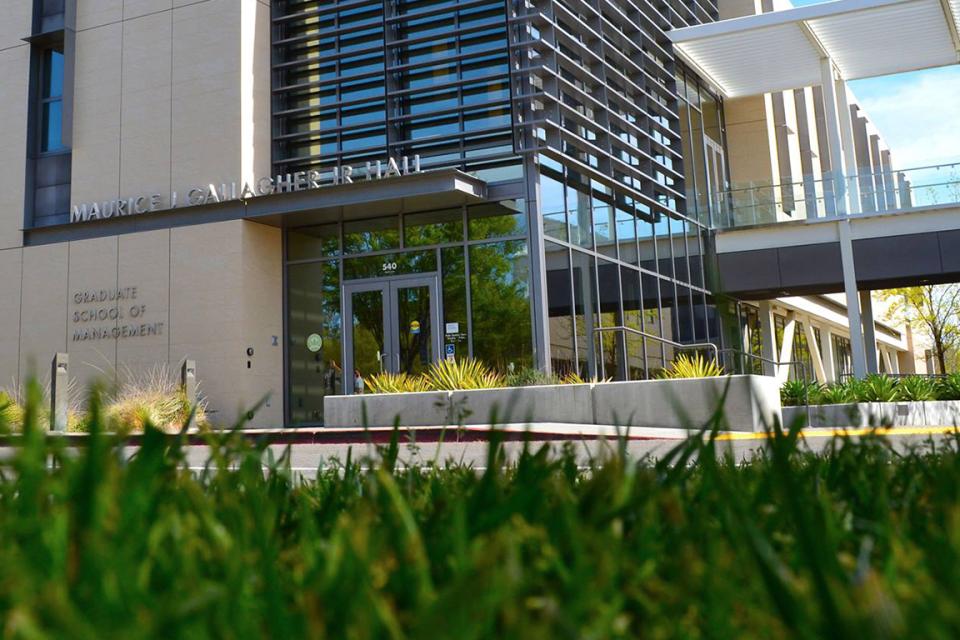What's New in B-Schools? 6 Big Changes at UC Davis

Perhaps it would be easier to start off by noting what’s NOT new in business schools globally. Business schools are ever evolving in response to changes in industry or shifts in regional needs, and also to remain competitive.
Long gone are the days when a general management MBA met all the needs of individuals aspiring to management positions in finance and marketing at large corporations or associate positions in banking and consulting firms.
Today, early career and mid-career employees are seeking leadership skills to advance their careers around the globe, or start new businesses, with a passion to make a positive impact on the world. Careers are more fluid, and business schools need to respond accordingly.
I’ve had the good fortune to work in different schools around the country, including Yale and NYU. I’ve been at the UC Davis Graduate School of Management for more than a dozen years, and witnessed this transformation from many angles.
The greatest change across the U.S. is the shift from business schools only offering a full-time MBA degree to adopting more flexible models, including part-time programs, executive, certificates and online options.
The Graduate School of Management has been at the forefront of many of these trends since it was founded in 1981. Over the past decade, we have grown and expanded. I invite you to take a closer look at us now!
Six recent changes at the Graduate School of Management:
- Our accounting master’s degree—the Master of Professional Accountancy (MPAc)—has been very successful in preparing graduates for rewarding careers in professional services. Our accelerated 9-month program is one of the first graduate accounting programs in California to embed data analytics into the curriculum. The program leads to the CPA exam and one of today's hottest job sectors. Average starting salary for our class of 2018 was $60,000 and 100% of U.S. eligible graduates had job offers within six months of graduation, many at the Big Four firms. Most of our MPAc students come straight from earning their undergraduate degree.
- The second cohort of our one-year Masters in Science in Business Analytics (MSBA) are teamed up on strategic projects for top sponsor companies. Located in the heart of San Francisco, the top 10 U.S.-ranked program blends data science with business results in exciting new ways. In the one-year practicum, which runs the duration of the program, students solve complex data analytics problems and present recommendations to the client company. The MSBA teaches the essential data skills and management savvy needed to excel in specialized roles in this fast-growing field. Many of our MSBA students come straight from earning their undergraduate degree.
- Industry Immersions diving into Biotechnology, Food and Agriculture, Sustainable Energy, Technology CFOs and Business Analytics are now in their second year. Each week, our MBA students hear firsthand from business leaders who challenge them—and their classmates from across campus in science and engineering—with a live case to solve. We are now developing additional programming that will include internships and projects. This year we added the Business Analytics Immersion in Sacramento in response to growing demands across sectors.
- Collaboration is one of our greatest strengths and we’ve based our curriculum on maximizing the impact of teamwork. It’s also one of the key reasons our alumni continue to be excited about the School decades after they graduate. Group-based and interactive courses and experiences provide the education needed for our graduates to be collaborative leaders in their fields. Our MBA curriculum, tailored to the needs of corporate recruiters, has evolved to include a capstone strategic project: MBA teams tackling pressing business issues for client companies. Whether in our Full-Time MBA program in Davis or one of Part-Time MBA programs in Sacramento or the San Francisco Bay Area, these projects give our students the hands-on experience that employers want and deliver value to the company.
- We’ve seen a growth in interest in concurrent degree programs, especially for JD/MBAs, MBA/MPH and Ph.D./MBA. These fields are seeing increase demand for leadership and business skills as well as for candidates to know how to scale up new business ideas or apply systems solutions to fields like public health. Partnering with colleagues across campus has become the new norm in our world as challenges and opportunities span disciplines and require a different way of thinking.
- Finally, we're offering new, hybrid online Business Fundamentals courses for UC Davis graduate students and industry practitioners. We started with the Department of Viticulture and Enology, and this summer we will partner with the School of Veterinary Medicine. The courses deliver a high-impact overview of management basics, providing business education when and where people want it, combined with in-person sessions to reinforce learning and encourage collaboration. This model is very different from just a few years ago.
Business schools are dynamic, which makes my career helping students exciting. If you have questions about whether one of our degree programs is the right step for you, please let our Admissions team know.